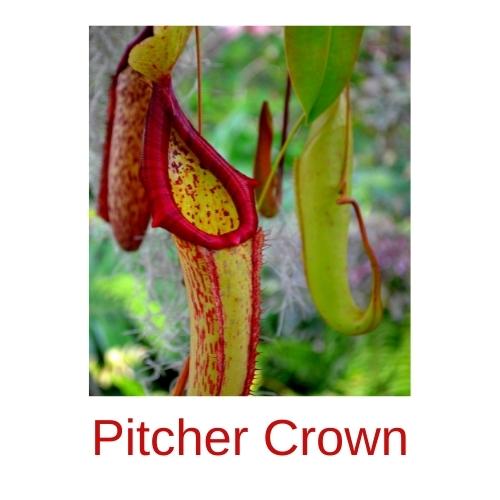Do you love pitcher plants? If so, then you need to know if they are poisonous or not. Unfortunately, it’s not as straightforward an answer as most of us would like – some Asian pitcher plants can be toxic. But don’t let that deter you from continuing your passion for these fascinating and unique species – there are precautions!
Are Asian pitcher plants poisonous to humans?
Asian pitcher plants are believed to be toxic, but contrary to popular opinion, it is not harmful to humans. Asian pitcher plants are known for their brightly colored pitchers that contain a fluid of digestive enzymes that trap and eat insects.
This fluid is likely not dangerous to humans if ingested and only poses mild irritation if it comes into contact with skin or eyes. There have been no reports of human fatalities from eating this plant’s pitchers, so it’s safe to say that Asian pitcher plants aren’t poisonous in the traditional sense of causing any serious harm.
What happens if you ingest Asian pitcher plants?
Ingesting Asian pitcher plants might seem like a strange thing to do at first glance, but some people use it as an herbal remedy. However, while they may think they are getting medicinal benefits out of it, they’re exposing themselves to several potentially hazardous consequences.
In some reported cases, consuming these plants has caused abdominal pain, vomiting, irregular heartbeats, and even difficulty breathing. While the dangers posed by Asian pitcher plants are still being studied, it’s typically best to steer clear of them; better safe than sorry!
Can handling Asian pitcher plants cause skin irritation?
It’s no secret that handling some plants can result in an unpleasant experience – and Asian pitcher plants are no exception. These fascinating carnivorous plants have a protective layer of fine hairs on their stems and leaves which release an irritant fluid when disturbed.
So if you’re considering interacting with these unique organisms, make sure you do so with caution! Gloves are highly recommended to protect your skin from any potential irritation or pain. Once properly protected, you can safely admire the intricate details of these remarkable specimens without fear of any stingy surprises.
Are there any risks associated with growing Asian pitcher plants?
While growing Asian pitcher plants might seem like a fun and relatively easy hobby, there are still risks associated with it. For one, Asian pitcher plants can be prone to infestations of mealy bugs which can damage the pitcher’s aesthetic and ruin the appearance of the entire plant.
Additionally, fertilizing this species incorrectly can quickly lead to an overabundance of fertilizer salts in their soil media which can throw off their delicate ecosystem balance and harm or even kill the plant if not corrected properly.
Luckily, with adequate research, some vigilance when inspecting for pests, and proper plant care techniques, these risks can be mitigated and you will soon have yourself a beautiful Asian pitcher plant that you can enjoy growing for years to come.
How do you safely handle Asian pitcher plants?
Asian pitcher plants can be great additions to any plant collection, but they need special care due to their unique structure. The first thing you should do is make sure to wear gloves as the leaves of the pitcher plant can irritate your skin.
When watering, pour carefully and try to avoid direct contact with the delicate nectar glands inside the pitchers or you could damage them. Use distilled or rainwater for best results, since the plant comes from a marsh environment, and only gives enough water to make it lightly moist.
Place the Asian pitcher plant in partial shade, preferably in an upright position so that it has sufficient humidity and remains stable when touched. Lastly, make sure not to over-fertilize, since too much nutrition will cause permanent damage to such a fragile species as this one.
What should you do if you come in contact with Asian pitcher plants?
If you happen to find yourself face-to-face with Asian pitcher plants, you should take certain precautions. These carnivorous plants have evolved specialized structures that can lure and capture insects.
Although they pose no threat to humans, it is important to be careful around them. If you do decide to go near one, make sure not to touch its tentacles as they are designed to trap small prey and may stick to your skin. Instead, simply observe the fascinating plant from a safe distance and admire its beauty!
What are the symptoms of Asian pitcher plant poisoning?
Asian pitcher plants are often admired for their striking beauty and delicate appearance, but what many may not know about this species is that it contains poison. It’s important to understand the symptoms of consuming its toxic compounds as Asian pitcher plants are increasingly popular among plant lovers and can easily be found in some homes!
Those who consume these plants’ extracts can expect a range of stomach-related issues like nausea, vomiting, abdominal pain, diarrhea, and cramps. Furthermore, the toxin can cause neurologic symptoms like headaches, dizziness, fatigue, restlessness, or vertigo.
In severe cases accompanied by intense pain, a doctor’s diagnosis should be sought right away to prevent any further health complications. Knowing the potential risks that come with owning these unique plants can help us be better prepared to handle an unfortunate accident!
Can pets be poisoned by Asian pitcher plants?
Asian pitcher plants are extravagant-looking plants that thrive in moist conditions and have fascinatingly unique traps; however, their beauty comes with danger for unsuspecting pets. These plants contain toxins that can be fatal when ingested by animals.
Unfortunately, inquisitive cats and dogs can be drawn to the sweet substances of these plants and accidentally ingest them. If your pet has access to an Asian pitcher plant, it is recommended to keep a close eye on them due to the risk of poisoning.
It is also important to remember that many common fertilizers contain traces of these toxins, so if your pet likes to get up close and personal with your garden, it’s best to take extra precautions against potential poisoning.
How toxic are Asian pitcher plants compared to other plants?
Asian pitcher plants are some of the most toxic plants known to man. They inhabit tropical areas where they take advantage of unsuspecting prey. Visually, they look like most other plants with slimy stems and wide leaves; however, within their bodies lies a lethal trap.
When small insects make the mistake of landing on the lip of the pitcher-shaped leaf, they fall into pools of digestive enzymes. While other plants may defend themselves by secreting toxins such as mustard oils and glycosides.
Asian pitcher plants specifically contain protoanemonin and iron ions that can be deadly to even larger animals. Although toxicity levels vary from species to species, it is safe to say that these particular plants should be handled with care.
Can you safely handle Asian pitcher plants without gloves?
Asian pitcher plants may look like your typical houseplant, but they can present a unique challenge to gardeners. While the plant itself is safe to handle without gloves, the nectar it produces can cause skin and eye irritation in some people.
As such, it’s best to err on the side of caution and wear gloves away while pruning or caring for this species of plant. Additionally, don’t forget safety goggles; the juice from these pitchers can sting your eyes if it gets in them when you’re not wearing eyewear!
Although you may be tempted to touch the slippery inner walls of a pitcher to get an up-close look at its intricate structure, it’s usually better for the plant if you avoid handling it too much. Rest assured that as long as you take a few extra precautions and care for your plant with careful attention, Asian pitcher plants make lovely additions to any home.
How can you prevent accidental ingestion of Asian pitcher plants?
Although Asian pitcher plants are mesmerizingly beautiful, their attractive red and white pitcher-shaped leaves serve as a powerful warning to keep away – they’re carnivorous! The pitchers are filled with a toxin-filled liquid that induces vomiting when accidentally ingested.
But don’t worry too much about accidentally drinking from these wild wonders; it’s quite difficult to get close enough to drink from them. Asian pitcher plants tend to grow in boggy areas, so just make sure you keep a safe and respectful distance! As long as you don’t bother the pitcher plants and observe them from afar, there won’t be any risk of accidental ingestion.
Conclusion
From our analysis, it is evident that Asian pitcher plants have a range of toxic chemicals which can cause irritation and even damage if handled without proper protective gear. That being said, these carnivorous plants can still make an interesting and unusual addition to the home, as long as careful attention is taken to ensure their safe handling. If you choose to adopt an Asian pitcher plant in your home and appreciate its unique beauty, just be sure to wear gloves when caring for it and consider rehoming it if you have children or pets in the house.








